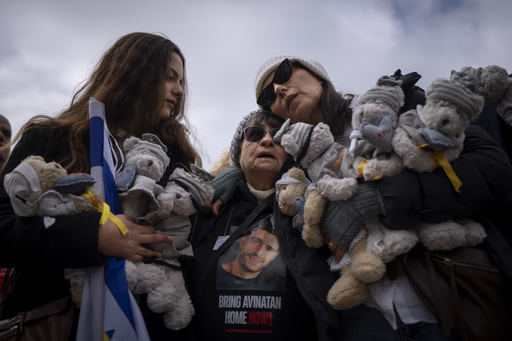“`html
In a significant development on Saturday, Hamas released the final six living hostages anticipated under the initial phase of a ceasefire agreement with Israel, leaving only a week left in this phase. The situation remains tenuous as uncertainties about the next phase of the deal loom large.
Among those released were three Israeli men who had been taken during the Nova music festival, as well as another individual who was with family in southern Israel when militants attacked the border on October 7, 2023. Additionally, two other hostages had been held for a decade after voluntarily entering Gaza.
Five of these hostages were returned in what many have described as demeaning ceremonies, criticized for their staged nature. Accompanied by armed masked Hamas fighters and in front of large crowds of Palestinians, the release included Omer Wenkert, Omer Shem Tov, and Eliya Cohen. Shem Tov, visibly joyful, expressed his emotions by kissing two fighters and blowing kisses to observers.
Family members of Cohen celebrated by chanting his name, while a jubilant Shem Tov expressed his deep affection for his parents by saying, “You’re heroes,” during their emotional reunion filled with laughter and tears.
Earlier on Saturday, two other hostages, Tal Shoham, 40, and Avera Mengistu, 38, were set free. Mengistu, who is of Ethiopian-Israeli descent, had entered Gaza in 2014. His family disclosed his struggles with mental health issues. Later, the Israeli military announced the release of Hisham Al-Sayed, 36, who had entered Gaza in 2015 and had a history of mental health diagnoses.
While over 620 Palestinians were expected to be released on the same day—the largest prisoner release scene during the ceasefire’s first phase—the handover was postponed, seemingly due to Israeli security discussions.
The release of the hostages came amidst an emotionally charged occurrence when Hamas mistakenly returned the wrong body for Shiri Bibas, an Israeli mother who had been abducted alongside her two children. The situation escalated tensions, leading Israeli Prime Minister Benjamin Netanyahu to promise retaliation for what he termed a “malicious violation.” In contrast, Hamas attributed the error to a misunderstanding.
Afterward, the group believed to be holding Bibas and her children returned a body later confirmed to be hers by forensic authorities. The Bibas family expressed mixed feelings about the closure, stating, “Now that it’s here, it brings no comfort, though we hope it marks the beginning of closure.”
In response to claims regarding the children’s deaths, Hamas denied responsibility, asserting that Israeli claims were fabricated to justify military actions against Gaza’s civilian population.
As the ceasefire has momentarily halted unprecedented and heavy fighting between Israel and Hamas, there are rising concerns over the potential for hostilities to resume once this initial phase concludes. Hamas has indicated plans to release four bodies next week, marking the completion of the first phase, after which they will still hold around 60 hostages, with an estimated half being alive.
Negotiations for the second phase of the ceasefire have not yet commenced, but they could prove challenging. Hamas has stated that it will not consider releasing the remaining hostages without a lasting ceasefire and substantial Israeli withdrawal from Gaza, a stance at odds with Netanyahu’s commitment to dismantle Hamas militarily and govern the territory while securing the return of all hostages.
An unnamed Israeli official disclosed that Netanyahu planned to meet with security advisers that evening to discuss the ceasefire’s prospects, focusing primarily on the mission to return all hostages, regardless of their status.
The freedom of hostages brought both relief and a slew of emotions. Cohen, Shem Tov, and Wenkert were returned while disguised in faux military outfits, despite not being in the military at the time of their abduction. Shoham’s family expressed the urgent need for comprehensive negotiations to secure the release of all remaining hostages.
Shoham, who holds dual Austrian-Israeli citizenship, was with family in Kibbutz Be’eri when he was abducted. His wife and two young children were previously freed in an exchange in November 2023. Mengistu’s family joyously welcomed him, singing as they celebrated their reunion, highlighting the decade-long wait.
His brother asked, “Do you remember me?” as they embraced, underscoring the emotional toll of the separation. Niva Wenkert, the mother of freed hostage Omer, conveyed her apprehension about his well-being despite his outward appearance, revealing the psychological and emotional scars that may remain unseen.
In the latest news regarding the Palestinian prisoners set for release, the list includes 620 individuals, out of which 151 had received life sentences or were convicted for violent offenses against Israelis. Almost 100 will face deportation, as reported by Palestinian prisoner advocacy groups.
Among those released is Nael Barghouti, who has spent an astonishing 45 years in prison for a past attack. The group consists of 445 men, with additional releases involving 18 minors aged between 15 to 17 years, five young adults aged 18 to 19, and a woman, all of whom had been taken into custody by Israeli forces during the ongoing conflict without charge.
The Israeli military offensive has resulted in over 48,000 Palestinian deaths, predominantly affecting women and children, according to reports from Gaza’s Health Ministry. The military claims to have killed more than 17,000 combatants without disclosing supporting evidence. The extensive offensive has devastated large sections of Gaza, leaving countless neighborhoods in ruins. At its height, displacements reached 90% of the population, many returning to find their homes utterly destroyed without any means of reconstruction.
The initial assault on October 7 resulted in approximately 1,200 fatalities, primarily among civilians, and hundreds of Israeli soldiers have also died in the ongoing conflict.
“`




